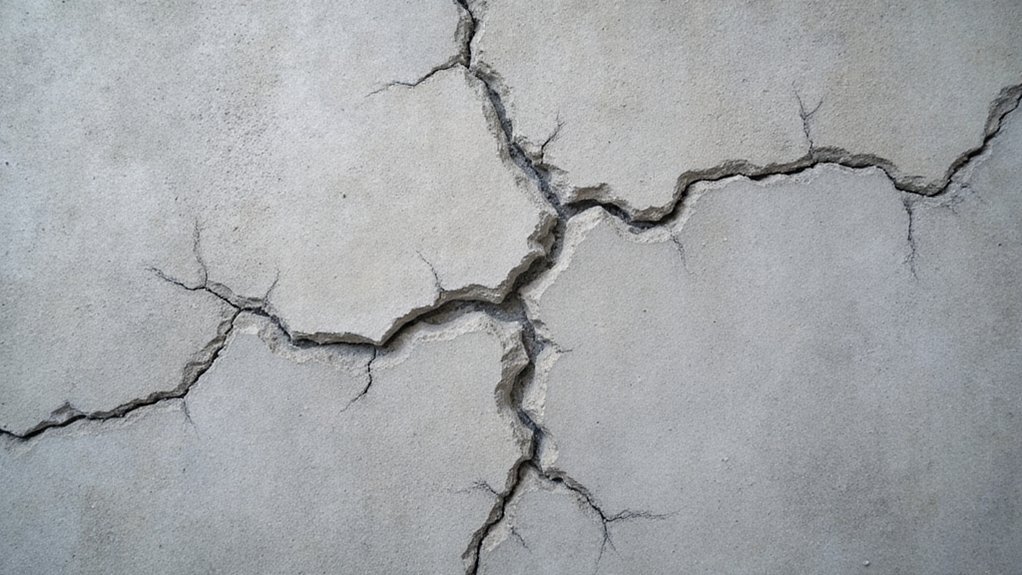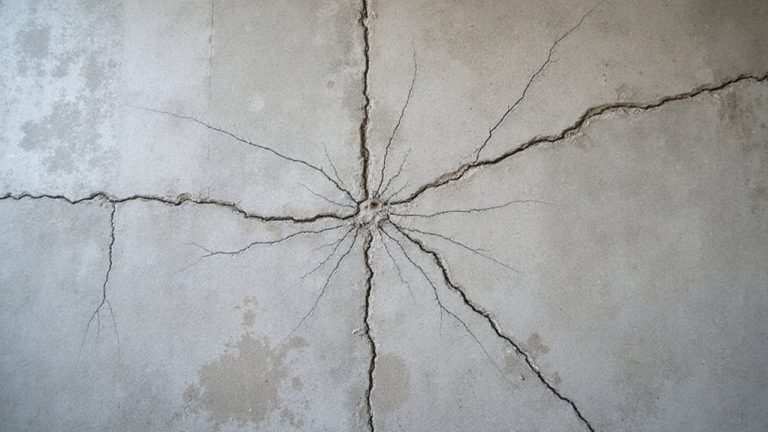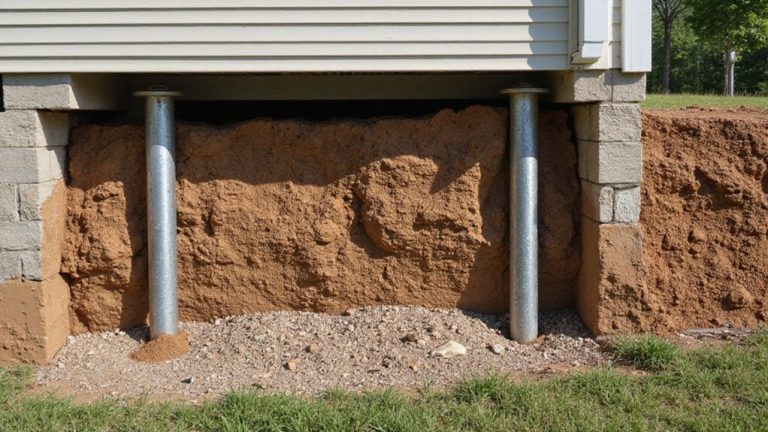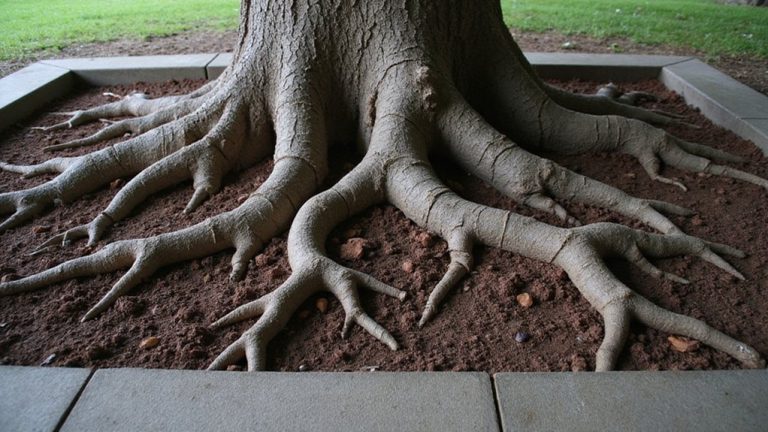Your home's foundation is its silent guardian, but when it starts whispering warnings, you can't afford to ignore them. Cracks, uneven floors, and sticking doors aren't just cosmetic annoyances—they're potential structural red flags. These subtle signs could signal serious underlying issues that won't just disappear. Ignoring them might mean turning a small repair into a wallet-draining nightmare. Want to know when it's time to call in the experts? Keep reading to protect your most prized possession.
Visible Foundation Cracks: Understanding the Warning Signs
When foundation cracks appear in your home, they can be more than just an eyesore—they're potential warning signs of serious structural issues. You'll want to pay close attention to these signals, as they might indicate subsidence patterns or insufficient drainage problems. Foundation settlement can cause various types of structural stress that compromise your home's integrity.
Different crack types reveal varying levels of concern: hairline cracks might be minor, while wider, horizontal fissures could signal significant structural stress. Don't ignore these warnings or assume they'll resolve themselves.
If you notice uneven floors, sticking doors, or visible wall separations alongside foundation cracks, it's time to consult a professional who can assess the potential risks and recommend appropriate repairs.
Uneven and Sloping Floors: What They Really Mean
Foundation cracks can quickly lead to another telltale sign of structural problems: uneven and sloping floors. If you've noticed your floor tiles aren't sitting flat or there's a noticeable tilt when walking across a room, it's time to pay attention. Bowing foundation walls are often the root cause of these structural irregularities, potentially compromising your home's stability. These subtle changes often indicate deeper structural integrity concerns that shouldn't be ignored. Uneven floors can signal serious foundation issues like soil movement, water damage, or structural weakening. Don't wait until the problem becomes more extensive and costly. A professional foundation inspection can help diagnose the underlying causes and prevent further damage to your home.
Doors and Windows That Stick: A Silent Foundation Problem
Home owners often brush off sticky doors and windows, but these seemingly minor issues can point to significant underlying foundation problems. When your interior door alignment becomes difficult or exterior window gaps start to appear, it's a red flag that your home's foundation might be shifting. These subtle changes often indicate soil movement, settling, or structural stress beneath your home.
Don't ignore these warning signs, as they can escalate into more expensive repairs. Your home's stability depends on catching these early indicators and seeking professional foundation assessment before small problems become major structural challenges.
Chimney and Exterior Wall Separation: Red Flags to Watch
If you've noticed your chimney pulling away from the exterior wall, it's more than just a cosmetic concern—it's a potential sign of serious foundation movement. These foundation tilt indicators can reveal significant structural shifts that shouldn't be ignored.
Exterior wall movement patterns like widening gaps or visible cracks signal your home's foundation might be experiencing uneven settling. When your chimney seems disconnected from the wall or you spot noticeable separations, it's time to call a professional. Don't wait until minor issues become major, costly repairs.
Basement Water Intrusion and Foundation Moisture Issues
Many homeowners experience basement water intrusion that can silently compromise their foundation's structural integrity. Water seeping through walls or pooling on basement floors isn't just a nuisance—it's a potential warning sign of serious ground water issues.
Your home's subsurface soil conditions can dramatically affect moisture penetration, creating pathways for water that gradually weaken foundation walls and create structural risks. When you notice consistent dampness, musty odors, or visible water stains, it's time to take action.
Don't wait until minor moisture problems escalate into costly foundation repairs that could threaten your home's stability and value.
Landscape and Soil Conditions That Threaten Your Foundation
Around 80% of foundation problems stem directly from terrain and soil conditions surrounding your property. Your landscape can greatly impact your home's structural integrity, especially when soil erosion and groundwater fluctuations become persistent issues.
Clay-heavy soils expand and contract with moisture changes, creating pressure that can crack and shift foundations. Tree roots near your home might also compromise foundation stability by drawing moisture and creating underground voids.
Understanding these environmental factors helps you proactively protect your most prized asset, preventing costly repairs and maintaining your property's long-term health and worth.
Foundation Settlement and Sinking: Identifying Serious Damage
Because foundation settlement can signal serious structural issues, homeowners must recognize the warning signs before minor problems escalate into major repairs. You'll want to watch for uneven floors, wall cracks, and doors that stick—these can indicate soil erosion and seasonal fluctuations causing foundation sinking.
Horizontal wall cracks, especially those wider than 1/4 inch, suggest significant structural stress. Pay attention to basement walls that bow or lean, as they might reveal underlying foundation movement. If you notice multiple signs of settlement, don't wait—contact a foundation repair expert who can assess the damage and recommend appropriate solutions.
Cost of Delay: Why Immediate Professional Intervention Matters
When foundation problems emerge, time becomes your most critical factor in preventing extensive damage and skyrocketing repair costs. Delaying professional intervention can alter minor issues into major unexpected expenses that drain your savings and jeopardize your home's structural integrity.
Prompt repair isn't just a recommendation—it's a necessity. Foundation damage compounds quickly, turning small cracks into significant structural risks that can reduce your property's value and compromise your family's safety.
Frequently Asked Questions
Can I Fix Foundation Issues Myself or Always Need a Professional?
You've got some do-it-yourself solutions for minor foundation issues, but complex problems demand a professional assessment. Don't risk your home's structural integrity by tackling serious repairs without expert guidance.
How Long Does a Typical Foundation Repair Process Usually Take?
You'll typically see foundation repairs take 2-5 days, depending on damage complexity. After identifying signs and scheduling a professional inspection, experts can determine your specific project's timeline and repair needs.
Will Foundation Repairs Affect My Home's Resale Value and Insurance?
Foundation repairs can impact your home's resale value, but addressing issues promptly shows homeowner liability and can actually improve property marketability. Proper documentation reassures potential buyers about your proactive maintenance approach.
Are Foundation Problems Covered by Homeowner's Insurance or Warranty?
Your policy coverage varies, but most homeowner's insurance won't cover foundation issues. You'll need a home inspection report to determine if your specific situation might qualify for potential compensation.
What's the Average Cost Range for Comprehensive Foundation Repairs?
You'll find foundation repair costs typically range from $2,000 to $7,500, depending on factors like damage extent, repair method, and home's structural complexity. Your specific situation will influence the final price.



